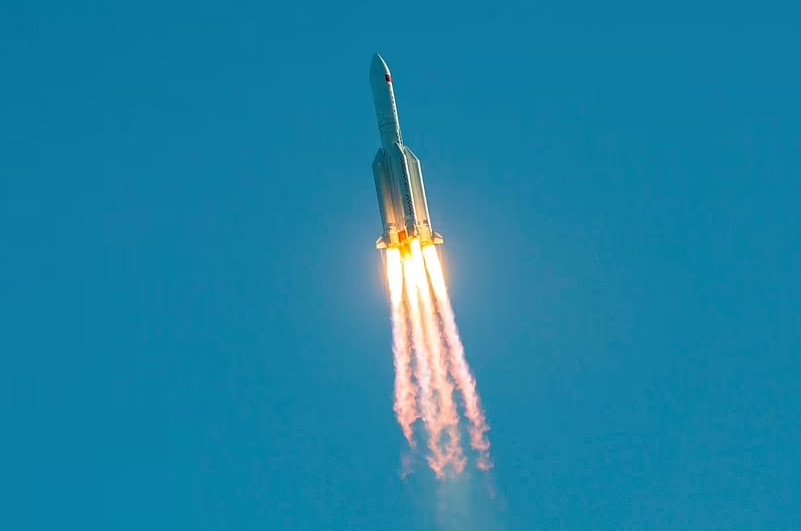According to the US government, the out-of-control 21-ton Chinese rocket Long March 5B is supposed to crash down to Earth on Saturday (May 8), likely entering a populated location.
The date of its planned reentry into Earth's atmosphere was announced by a Department of Defense spokeswoman, but the precise entry point could not be confirmed at this time.
The government will have more details 'if it becomes accessible,' according to the spokeswoman, and regular updates on its position will be provided on Space Track.
Other satellite trackers have observed the 100-foot-long, 16-foot-wide rocket shell, now dubbed '2021-035B,' traveling at over four miles per second – powerful enough to orbit the Earth in under two hours.
'US Space Command is aware of and monitoring the Chinese Long March 5B's position in space, but its precise entry point into the Earth's atmosphere cannot be pinpointed until hours before its reentry, which is scheduled about May 8,' said US Department of Defense spokesperson Mike Howard.
Last week, Tianhe, the first building block of China's future space station, was launched into orbit by the Long March rocket 5B.
On Thursday, Tianhe was launched from the Wenchang Space Launch Centre in Hainan, China, using China's largest carrier rocket, the Long March 5B. (April 29).
A Department of Defense spokesperson revealed the date of its expected reentry into Earth's atmosphere, but said its exact entry point can't currently be determined. Pictured is the rocket's current orbit.
China's 21-ton Long March 5b core stage rocket is orbiting the planet in a path that could lead to the massive vehicle crashing back to Earth within the next few days, experts warns. Pictured is the rocket when it launched last week.
'It's potentially not good,' Jonathan McDowell, an astronomer at the Harvard-Smithsonian Center for Astrophysics, told the Guardian.
'Last time they launched a Long March 5B rocket they ended up with big long rods of metal flying through the sky and damaging several buildings in the Ivory Coast.
'Most of it burned up, but there were these enormous pieces of metal that hit the ground. We are very lucky no one was hurt.'
Earlier this week, McDowell said that the rocket's core stage – essentially the backbone of the rocket – will re-enter Earth's atmosphere 'uncontrolled'.
He told SpaceNews that its path takes it to a latitude approximately level with New York and Madrid, and as far south as southern Chile and Wellington, New Zealand'.
It could land somewhere in this range, but much of it is expected to burn up in the atmosphere before touching Earth.
'But the chance of injury to individuals or property continues,' SpaceNews said. Debris that doesn't burn up could end up in the oceans or uninhabited areas.
Over the past few days, space debris trackers have seen it traveling steadily and unpredictably toward Earth, and its reentry will be one of the biggest unregulated descents ever seen.
In May of last year, the previous Long March 5B flight saw the fourth largest unregulated re-entry ever.
After soaring over Los Angeles and New York City, it splashed down in the waters off the west coast of Mauritania, well off the coast of West Africa.
He went on to say that the Long March 5B is seven times larger than the Falcon 9 second stage, which re-entered above Seattle a few weeks ago and drew a lot of interest.
'I think by current standards it's unacceptable to let it [the core stage] re-enter uncontrolled,' he added.
Furthermore, the Tianhe launch was the first of 11 missions needed to complete China's upcoming space station, which is expected to rival the International Space Station.
After more modules are deployed, China hopes to complete its Tiangong (Heavenly Palace) Space Station by the end of 2022, according to state media.
When done, the Chinese Space Station will orbit the Earth at a height of 340 to 450 kilometers (211 to 280 miles).


